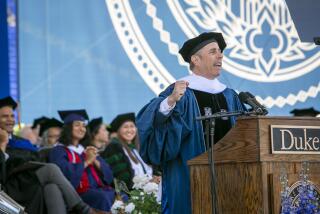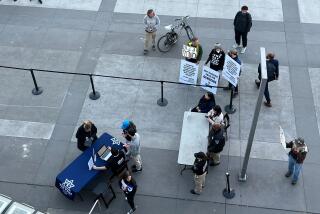Angry Blacks Say Conference Links Genetics, Crime : Social problems: Activists blast scheduling of speaker who last year compared violent monkeys and inner-city youths. His appearance has been canceled.
- Share via
Black health and community activists Wednesday protested the holding of a first-ever academic conference in Los Angeles linking drug abuse, mental disorders and ethnic groups.
The critics said they believe the meeting, co-sponsored by the Drew University of Medicine and Science, is a veiled attempt to revive efforts among national health researchers to study possible genetic links to crime.
The three-day conference, known formally as the “Conference on Psychopathology, Psychopharmacology Substance Abuse and Ethnicity,” is scheduled to begin today at the Renaissance Hotel near Los Angeles International Airport. Among its printed list of presentations, there are no reports that specifically deal with genetic links to crime. Subjects include such topics as the diagnosis of mood disorders, the psychiatric complaints of persons infected with the AIDS virus and the psychological consequences of violence on victims.
But the leadoff speaker of the conference was to have been Dr. Frederick Goodwin, director of the National Institute of Mental Health. Goodwin in 1992 inflamed the black community when he made comparsons between inner-city youths and violent, oversexed monkeys who live in the wild. Goodwin apologized for the remarks, but lost a presidential appointment as administrator of the now-defunct Alcohol, Drug Abuse and Mental Health Administration.
Goodwin has withdrawn from the conference, but critics were not mollified.
“This is a person who has spoken against our inner-city youth, and to invite him to kickoff a conference in our community is an insult to us,” said Patois DeSandies, a member of the community advisory board of the Los Angeles County Department of Childrens Services and an activist in the black community.
Goodwin was not available for comment, but a spokesperson said he withdrew from the conference because of a scheduling conflict.
Dr. Reed V. Tuckson, the president of Drew, which is the only black medical school west of the Mississippi, said he was shocked by the criticism.
“This conference has nothing to do with Dr. Goodwin’s personal research issues or interests. He was invited here to discuss the direction the federal government was going in the area of mental health, which is an entirely appropriate question to ask,” he said.
Tuckson said the conference was organized by a researcher at Drew, Tony L. Strickland. Tuckson noted many of the physicians and health researchers at the conference were black and other people of color.
Other sponsors of the conference are the National Institute of Mental Health, the National Institute on Drug Abuse, the American Psychological Assn. and the Upjohn Co., a drug manufacturer.
Critics of the conference complained that research into crime, drug abuse and other social issues often unfairly centers on black males. “You can’t blame those problems on science and genetics. Somehow, social issues have become a medical issue and that’s why we are upset,” DeSandies said.
Dr. Ernest Smith, a pediatrician at Martin Luther King Jr./Drew Medical Center, criticized any efforts aimed at exploring genetic links with crime or drug abuse.
“There is a national policy that appears to be directed toward our youths,” said Smith, who also is on the faculty of Drew University. Smith called Drew “a patsy” for lending its name to the conference.
Also speaking out against the conference were Danny Bakewell of the Brotherhood Crusade and Legrand Clegg II, the city attorney of Compton.
The controversy is similar to a protest that developed last month over a conference sponsored by the University of Maryland that would have examined genetic links to crime. That conference was postponed after strong protests from black leaders in Congress and elsewhere, who challenged the racial implications of linking crime to genetics. Funds to finance the conference were subsequently withdrawn by the National Institutes of Health. However, the university successfully appealed the action on grounds NIH was interfering with academic freedom and a new conference is being planned.
More to Read
Sign up for Essential California
The most important California stories and recommendations in your inbox every morning.
You may occasionally receive promotional content from the Los Angeles Times.













